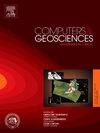预测含水层渗透系数K的混合学习策略
IF 4.2
2区 地球科学
Q1 COMPUTER SCIENCE, INTERDISCIPLINARY APPLICATIONS
引用次数: 0
摘要
含水层渗透系数(K)对于理解、管理和保护地下水资源至关重要。然而,直接从泵送测试中获得可靠的K值是昂贵且耗时的,通常会产生次优结果,从而导致重大的经济损失。机器学习的最新进展为估算K提供了另一种经济有效的方法。然而,主要的挑战在于大量缺失的K数据,因为K测量只能在含水层中记录。这种稀疏和不完整的数据严重限制了经典监督学习方法的有效性。为了解决这一挑战,我们提出了一种混合学习策略(MXS),该策略结合了无监督和有监督技术来改进K预测。首先,应用K- means聚类方法来描绘naïve含水层(NGA)组,有效地为无法直接测量K的层生成代理标签。接下来,将这些NGA标签与现有的K值集成,形成用于监督预测的增强输入特征。然后,我们应用支持向量机(svm)和极端梯度增强(XGB)来更准确地预测K。实验结果表明,当使用混淆矩阵和微观和宏观平均精度召回率指标进行评估时,支持向量机和XGB的预测准确率都超过80%。在独立井眼数据集上测试MXS方法证实了其鲁棒性和有效性。通过在存在重大数据缺口的情况下实现准确的K值预测,MXS支持更明智的决策,减少抽水测试失败的可能性,并有助于地下水资源的可持续规划和管理。本文章由计算机程序翻译,如有差异,请以英文原文为准。
A mixture learning strategy for predicting aquifer permeability coefficient K
Aquifers permeability coefficient (K) is critical for understanding, managing, and protecting groundwater resources. However, obtaining reliable K values directly from pumping tests is costly and time-consuming, often yielding suboptimal results that lead to significant financial losses. Recent advances in machine learning offer an alternative, cost-effective approach for estimating K. Yet, the primary challenge lies in the substantial proportion of missing K data, as K measurements can only be recorded in aquifer layers. Such sparse and incomplete data severely limit the effectiveness of classical supervised learning methods. To address this challenge, we propose a mixture learning strategy (MXS) that combines unsupervised and supervised techniques to improve K prediction. First, a K-Means clustering approach is applied to delineate a naïve group of aquifers (NGA), effectively generating proxy labels for layers where direct K measurements are unavailable. Next, these NGA labels are integrated with existing K values to form enhanced input features for supervised prediction. We then apply support vector machines (SVMs) and extreme gradient boosting (XGB) to predict K more accurately. Experimental results show that both SVMs and XGB achieve prediction accuracies exceeding 80% when evaluated using confusion matrices and micro- and macro-averaged precision-recall metrics. Testing the MXS approach on an independent borehole dataset confirms its robustness and effectiveness. By enabling accurate K predictions in the presence of significant data gaps, MXS supports more informed decision-making, reduces the likelihood of unsuccessful pumping tests, and aids in the sustainable planning and management of groundwater resources.
求助全文
通过发布文献求助,成功后即可免费获取论文全文。
去求助
来源期刊

Computers & Geosciences
地学-地球科学综合
CiteScore
9.30
自引率
6.80%
发文量
164
审稿时长
3.4 months
期刊介绍:
Computers & Geosciences publishes high impact, original research at the interface between Computer Sciences and Geosciences. Publications should apply modern computer science paradigms, whether computational or informatics-based, to address problems in the geosciences.
 求助内容:
求助内容: 应助结果提醒方式:
应助结果提醒方式:


